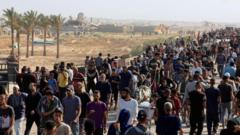The Gaza Humanitarian Foundation is under fire as reports of deaths and injuries near aid sites escalate. GHF's head defends operations, contesting accusations from the UN about their safety while the situation in Gaza worsens.
Controversy Surrounds Gaza Humanitarian Operations Amid Rising Casualties

Controversy Surrounds Gaza Humanitarian Operations Amid Rising Casualties
GHF chief Johnnie Moore faces criticism as scores of Palestinians die while seeking aid from their distribution sites.
The head of the Gaza Humanitarian Foundation (GHF) is defending its operations amidst increasing fatalities among Palestinians seeking assistance. Johnnie Moore addressed the criticisms during an interview with the BBC World Service, acknowledging that fatalities have occurred near GHF aid points but disputing claims that these deaths can be solely linked to the organization. He accused various international entities, including the UN, of disseminating unverifiable information regarding the situation.
The UN Secretary-General, Antonio Guterres, labeled GHF's operations "inherently unsafe," stressing that efforts to secure sustenance must never endanger lives. Reports from the Hamas-led health ministry in Gaza indicate that over 500 Palestinians have died and around 4,000 have been injured while attempting to access aid since GHF's involvement began.
Following the commencement of GHF's operations in late May, a series of fatal incidents occurred in early June, prompting global outcry. Nearly daily reports of casualties at GHF’s aid sites—located within Israeli military zones—have raised alarm among the UN and humanitarian organizations. Eyewitness accounts suggest that Israeli forces have fired upon individuals gathering for aid.
An article published by Haaretz cited anonymous IDF soldiers alleging that orders were given to shoot at unarmed civilians to disperse them. However, Israeli Prime Minister Benjamin Netanyahu repudiated these claims, identifying them as false. The IDF maintained that it had not directed forces to intentionally harm civilians near distribution centers.
Moore countered the allegations regarding GHF's responsibility for casualties, expressing skepticism towards claims of consistent targeting by the IDF. In recent statements, the IDF acknowledged firing "warning shots" at individuals they deemed "suspects" but denied any direct intent to harm civilians.
Despite the challenging environment for aid delivery, with restrictions preventing international media from entering Gaza, Moore remains steadfast in his defense, stating that assertions of deaths linked to GHF operations are disinformation. He cited a prior lack of security resulting in hijackings of UN aid trucks—a claim the UN has disputed.
As the influx of aid remains inadequate and the humanitarian crisis deepens, GHF aims to provide a staggering 50 million meals to the people of Gaza, a feat that, according to Moore, is an improvement over previous distributions, albeit inefficient. He underscored the need for collaboration with larger organizations like the UN to effectively address the dire circumstances.
Recently, the US State Department announced a $30 million aid package for GHF, marking its first known financial contribution to the group amid an ongoing Israeli military campaign in Gaza following a previous attack by Hamas, which resulted in substantial casualties. Reports indicate that over 56,000 individuals have died in Gaza since the increase in military action.



















